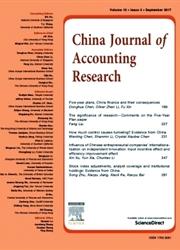Can independent directors effectively monitor controlling shareholders after reappointment?
IF 4
Q2 BUSINESS, FINANCE
引用次数: 0
Abstract
The mandatory rotation of independent directors upon the expiration of their term is a key institutional design in China, aimed at safeguarding their independence and enhancing the effectiveness of their supervision. However, whether reappointing these directors after a “cooling-off period” following mandatory rotation undermines the effectiveness of supervision remains an open question. We investigate whether independent directors can effectively monitor tunneling activities after their reappointment. We find that their monitoring is less effective during their reappointment term than in their first term, reflected in a significant increase in related-party transactions with controlling shareholders. A mechanism test reveals that independent directors’ monitoring behavior is more passive during the reappointment term, as evidenced by less dissent and a lower likelihood of challenging proposals related to controlling shareholders. These effects are more pronounced when reappointed independent directors are less willing or able to supervise, or when the company’s internal and external governance environment is poor. Supervision also appears to be more effective if they are reappointed after a cooling-off period of more than three years. This paper extends research on the governance impact of reappointed independent directors and provides empirical evidence that can help to improve their post-term management practices.
独立董事连任后能否有效监督控股股东?
在中国,独立董事任期届满后强制轮换是一项重要的制度设计,旨在维护其独立性,提高其监督的有效性。然而,在强制轮岗后的一段“冷静期”后重新任命这些董事,是否会削弱监管的有效性,仍是一个悬而未决的问题。我们考察了独立董事连任后是否能够有效地监督隧道行为。我们发现,在他们的连任期内,他们的监督效果不如第一任期,这反映在与控股股东的关联交易显著增加上。机制检验表明,独立董事在连任期内的监督行为更为被动,表现为异议较少,提出与控股股东相关的挑战提案的可能性较低。当重新任命的独立董事监督意愿或能力较差,或公司内外部治理环境较差时,这种影响更为明显。如果他们经过三年以上的冷静期后重新任命,监管似乎也会更有效。本文扩展了对连任独立董事治理影响的研究,并提供了有助于改进其任期后管理实践的实证证据。
本文章由计算机程序翻译,如有差异,请以英文原文为准。
求助全文
约1分钟内获得全文
求助全文
来源期刊

China Journal of Accounting Research
BUSINESS, FINANCE-
CiteScore
4.70
自引率
0.00%
发文量
295
审稿时长
15 weeks
期刊介绍:
The focus of the China Journal of Accounting Research is to publish theoretical and empirical research papers that use contemporary research methodologies to investigate issues about accounting, corporate finance, auditing and corporate governance in the Greater China region, countries related to the Belt and Road Initiative, and other emerging and developed markets. The Journal encourages the applications of economic and sociological theories to analyze and explain accounting issues within the legal and institutional framework, and to explore accounting issues under different capital markets accurately and succinctly. The published research articles of the Journal will enable scholars to extract relevant issues about accounting, corporate finance, auditing and corporate governance related to the capital markets and institutional environment.
 求助内容:
求助内容: 应助结果提醒方式:
应助结果提醒方式:


